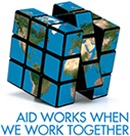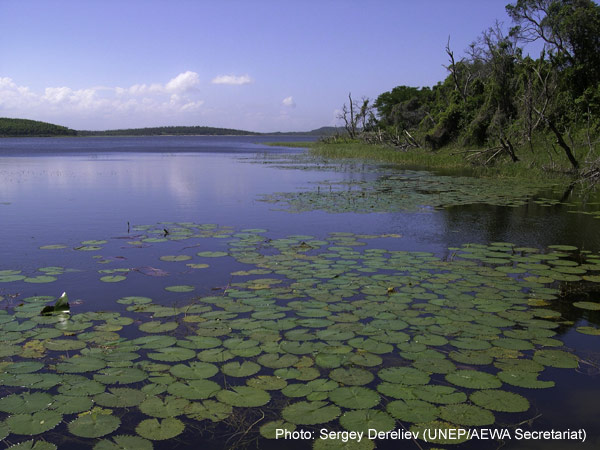Welcome to the July 2010 issue of the Global Washington newsletter. If you would like to contact us directly, please email us.
IN THIS ISSUE
Note from our Executive Director

Greetings,
It’s been wonderful to see so many of you at Global Washington’s recent events. This summer, the spirit of our global development community has felt especially collaborative and committed to positioning our state as a leader in global development work.
In early July, our policy paper “Global Development through Aid, Partnerships, Trade and Education: Recommendations from Global Washington” brought together over 400 people from the sector. Senator Cantwell demonstrated enthusiastic support for the policy recommendations, and pledged to take the recommendations to her colleagues in the Senate and the Obama administration. Many of you contributed to this paper, and its success is a reflection of all of your hard work and dedication.
Global Washington’s Second Annual Conference on November 15 & 16 promises to build on this collective approach. Our theme this year is Bridges to Breakthroughs: How partnerships and innovation are changing the world. Our amazing Conference Planning Committee and I are in the process of putting together an informative and inspiring event that features thought leaders and luminaries in the global development sector. Early registration begins July 29th!
We continue to seek out new ways to deepen our commitment and programming to the global development community in Washington State. You are all doing valuable work in the field, and Global Washington aims to provide a space for you to exchange ideas, share best practices, and troubleshoot challenges with other individuals and organizations in the sector doing similar work.
Thank you for supporting the vision and mission of Global Washington. I wish you a wonderful summer, and I hope to see you soon!
In unity,

Bookda Gheisar, Executive Director
Featured Organization: Clear Path International
 For centuries, wars have been disrupting the daily lives of innocent civilians. But whileconflicts may have an official ending, the terrors of war often linger long after hostilities end. One of the most frightening remnants of war is the existence of minefields and unexploded ordnance blanketing former battlefields. Mines kill or wound an innocent civilian nearly every 30 minutes, killing or seriously injuring 15,000 to 20,000 people a year.
For centuries, wars have been disrupting the daily lives of innocent civilians. But whileconflicts may have an official ending, the terrors of war often linger long after hostilities end. One of the most frightening remnants of war is the existence of minefields and unexploded ordnance blanketing former battlefields. Mines kill or wound an innocent civilian nearly every 30 minutes, killing or seriously injuring 15,000 to 20,000 people a year.
Landmine and unexploded ordnance accidents pose serious impacts on the survivors, their families, and their communities. Survivors of landmine and bomb explosions are often left severely injured, both physically and financially. Injuries sustained from a mine accident often prevent the victim from pursuing education or work opportunities, leaving families without a much needed income.
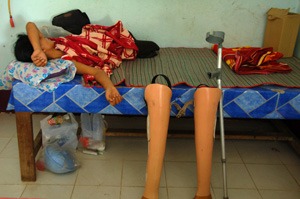 Given that the majority of minefields and unexploded ordnance reside in the developing world, the impacts of explosions are even more pronounced. Local communities do not usually have the resources to treat land mine victims’ physical and psychological injuries. Thus, it is the mission of Clear Path International (CPI) to serve not only the victims of landmine and bomb explosions, but their families and communities as well, to ensure victims are able to reenter their community with renewed confidence.
Given that the majority of minefields and unexploded ordnance reside in the developing world, the impacts of explosions are even more pronounced. Local communities do not usually have the resources to treat land mine victims’ physical and psychological injuries. Thus, it is the mission of Clear Path International (CPI) to serve not only the victims of landmine and bomb explosions, but their families and communities as well, to ensure victims are able to reenter their community with renewed confidence.
Founded in October of 2000, CPI initially focused its efforts solely on the heavily mined area surrounding the former Demilitarized Zone in central Vietnam. Here, Martha and James Hathaway, Imbert Matthee, and Kristen Leadem saw the terrifying results of landmine explosions and decided to join together to ease the suffering of landmine accident survivors. At first, CPI incorporated de-mining into its assistance activities, but later abandoned it to focus on landmine survivor assistance.
After a year of successfully helping to rehabilitate landmine accident survivors in Vietnam, CPI began to expand in 2001. First, CPI spread its operations to Cambodia, where decades of civil war has left the country with the largest per-capita population of mine amputees in the world. Then, in 2002, CPI expanded to reach Burmese refugee landmine accident survivors on the Thai-Burma border. More recently, CPI opened operations in Afghanistan where around 60 landmine accidents are reported each month.
 To assist in the rehabilitation process, CPI offers a variety of services customized to the needs of each landmine or unexploded ordnance survivor. Paramount to the survival of the victims of landmine explosions, medical attention must be attained as quickly as possible. To ensure the initial survival of landmine and bomb explosions, CPI provides access to emergency medical care, access to hospitals and life-saving surgery.
To assist in the rehabilitation process, CPI offers a variety of services customized to the needs of each landmine or unexploded ordnance survivor. Paramount to the survival of the victims of landmine explosions, medical attention must be attained as quickly as possible. To ensure the initial survival of landmine and bomb explosions, CPI provides access to emergency medical care, access to hospitals and life-saving surgery.
Often, survivors of landmine explosions lose limbs and are thus at a serious disadvantage in the pursuit of education and work. To counter these impacts of landmine accidents, CPI helps victims attain prosthetics and helps to provide survivors with access to physical rehabilitation programs. As a way to help accident survivors reenter the workforce and secure a reliable income, CPI provides employment assistance through vocational skills training and scholarships.
In order to implement this assistance strategy, CPI partners with community organizations and local leaders. With the exception of Vietnam, where CPI is more hands-on, implementation of the projects is left up to the local partners while CPI provides financial, capacity building, and technical assistance. In Cambodia for example, the Phum Seam Farmers’ Cooperative and Rice Mill was established in 2006 to provide socio-economic and agricultural support to landmine survivors in three districts in northwestern Cambodia. This community, located in the K-5 mine belt, is one of the hardest hit by Cambodia’s recent history of genocide and civil war. CPI and its partner Cambodian Volunteers for Community Development have served over 3000 beneficiaries through the activities of the rice mill and farmers’ cooperative, vocational training and micro-credit lending programs.
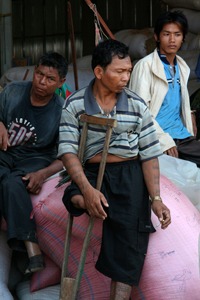 In the future, CPI is planning to expand further to meet the needs of landmine survivors in Laos and Lebanon. Also possible in the future is a revival of mine clearance activities on a more responsive, small-scale basis.
In the future, CPI is planning to expand further to meet the needs of landmine survivors in Laos and Lebanon. Also possible in the future is a revival of mine clearance activities on a more responsive, small-scale basis.
The impact CPI has on the lives of landmine and unexploded ordnance survivors is undeniable. Through lifesaving medical treatment, access to physical rehabilitation, and educational and employment opportunities, CPI enables survivors to go about their daily lives without disruption.
To learn more about Clear Path International and their integral lifesaving activities, please visit the CPI website.
top
Changemaker: Steve Crane – Making a Difference Through Innovation
“Paths are made by walking” has been the guiding principle for Steve Crane’s work as a changemaker.
From expanding Washington State government’s’ international program focus to building new Rotary partnerships in Zambia, Steve is an envoy for Washington’s global development efforts. He is a strong believer in building opportunities and encouraging collaboration through business, trade, and innovative public-private partnerships.
When asked about the origin of his interest in fostering development through trade, Steve recalled his frustration with the trend toward econometrics in economic theory at the time of his undergraduate studies. That was not about refining theories to better predict real people’s behavior, which was Steve’s sense of how economics should be used. He wanted to learn how disadvantaged people can be empowered to change their lives. At Stanford and John Hopkins School of Advanced International Studies, he worked with third world development practitioners whose advice was changing the economic prospects of poor countries.
 Steve entered the business world believing that corporations can be agents of positive, sustainable change in the lives of the communities where they operate. At NCR Corporation, he convinced senior management that they should have a host country relations policy in the developing countries where NCR was doing business. That new initiative encouraged Steve’s later work on public-private partnerships and corporate social responsibility.
Steve entered the business world believing that corporations can be agents of positive, sustainable change in the lives of the communities where they operate. At NCR Corporation, he convinced senior management that they should have a host country relations policy in the developing countries where NCR was doing business. That new initiative encouraged Steve’s later work on public-private partnerships and corporate social responsibility.
In the early 1970s, trade’s importance to Washington State was not widely understood. To change this, Steve had a key role in establishing the Washington Council on International Trade. WCIT educated public officials, high school teachers and the public at large about trade’s critical role in Washington’s future. In the late 1970s, Steve joined the senior management at AFS International, a leading high school student exchange program, to increase their funding. He initiated corporate partnerships in Australia, New Zealand, Hong Kong, Japan, and Southeast Asia, building on company’s interest in hiring graduates with experience living abroad. This campaign raised over $6 million to support sending African students to homes and schools in these countries and here in the United States, enriching the program’s diversity.
Steve’s innovative mindset has led to many first-of-its-kind projects leveraging Washington State’s resources to make an impact on developing countries, especially in Asia. In the 80’s, as the head of the International Division of the Washington State Department of Commerce, Steve staged the State’s first major international conference that featured trade and investment opportunities in Southeast Asia. In 1991, he convinced business colleagues and Seattle City officials to establish the Seattle-Surabaya (Indonesia) Sister City relationship based on mutual development interests. That led to the exchange of trade delegations that included State, City and Port officials who had never traveled to the other country. It also fostered a partnership between Seattle’s and Surabaya’s water utilities to introduce water quality control policies there.
Following his wide-range of accomplishments at a variety of private companies, non-profit organizations and state government, Steve continued his change-making efforts by founding his own consulting company, Crane International Inc. He remains an active participant in national and local committees contributing to global development. In 1999, Steve arranged a Seattle visit by World Bank President James Wolfensohn as a guest of the City and WCIT. That visit led to engaging the City, UW, and business leaders in a Sister City partnership with the Haiphong (Vietnam) City government and the World Bank to improve their services and tourism prospects. Steve chairs the trade policy committee providing advice to Global Washington on its recently published Policy Paper – “Global Development through Trade, Aid, Education, and Partnerships: Recommendations from Global Washington.”
Steve is also the co-chair of the International Service Committee (ISC) of Seattle Rotary, which manages a diverse project portfolio of Rotary partnerships abroad to empower less advantaged people to significantly improve their lives. Seattle Rotary is the largest and fourth oldest Rotary Club in the world, which, Steve believes, offers ISC members a special opportunity and responsibility to lead project partnerships.
For example, the ISC is now steering an exciting malaria control pilot project in Zambia in partnership with Rotary Clubs there and with PATH. This project will build individual Club partnerships with Seattle-area Clubs and support the formation of a Zambia-based steering committee to plan and oversee their malaria control activities. Zambian Clubs will work with local government health workers and leaders to train and equip neighboring communities to prevent malaria. Combined with other anti-malaria work in Zambia, this partnership aims to engage Rotarians in the campaign to eradicate malaria there. It also is building a model for Rotarians to work with governments and NGOs on a national scale in other countries.
Another current ISC project is restoring their water supply to tribal mountain villages north of Mumbai, India. A partnership with a Mumbai Rotary Club, a local NGO and other US Clubs is empowering villagers to restore their depleted aquifer by capturing monsoon rainfall runoff. Steve enthusiastically explained that with the contour bunds and mini-dams villagers are building, “valuable topsoil will be saved, well pumps will draw water again, wasteland will be converted to kitchen gardens and fruit orchards, jobs will be created, agricultural output will be increased, and villagers’ health and education will be improved.” These changes will be sustained by committees of local villagers with the support and oversight of Rotarians. The longer term objective Steve foresees is to “establish corporate partnerships that extend this model program to many more depleted aquifers and poor villages in India and, perhaps, to other countries in the developing world.”
During our interview, I could really feel Steve’s enthusiasm about Global Washington. His first response to my question of what advice he would give to organizations or people who would like to contribute to the development sector is – “Join Global Washington!” Aligned very closely with this belief in innovation and collaboration, Steve thinks that Global Washington’s strength lies in the exciting forums it provides to encourage new relationships to be formed, and new ideas to be fashioned and pursued with partners that have complementary skills and strengths.
If you are interested in learning more about Steve Crane’s works, you may email him at Craneintl@aol.com.
*Photo courtesy to Jim Moore.
Book Review
Up and Out of Poverty: The Social Marketing Solution
by Philip Kotler and Nancy R. Lee
2009 Wharton School Publishing
$29.91 Hardcover

Up and Out of Poverty offers readers a fascinating journey into the world of social marketing, a process which applies a mix of proven marketing principles and techniques to benefit society as well as the target audience, and which uses “ constructive approaches to support desired behavior changes “. Since its founding in the 1970’s social marketing has been used effectively to reduce tobacco usage, increase literacy, and advance a wide variety of social causes. Authors Kotler and Lee now present a compelling case for incorporating social marketing as an integral component of poverty reduction solutions.
Packed with helpful information, this book is a valuable resource for new and seasoned actors in global development, who plan, implement or evaluate poverty reduction programs. Employing a series of intriguing case studies throughout, the authors deconstruct poverty reduction programs from Kampala, Uganda to the streets of New York, clearly demonstrating the application of social marketing principles.
The book is divided into three parts, the first of which presents the poverty problem in broad terms, including current thinking about poverty solutions and 5 commonly accepted definitions of poverty. These range from the World Bank’s “absolute definition” of extreme poverty, as those living on less than $1.25 a day, to the Human Poverty Index, which takes into consideration the likelihood of a child not surviving to age 60, along with other key factors. The authors estimate we are looking at approximately 4 billion people living in extreme, moderate or relative poverty, with “90% living in Sub-Saharan Africa, East Asia, and South Asia”.
Kotler and Lee present and assess four traditional, strategic paths for reducing poverty: economic growth, redistribution, foreign aid and population control. They advocate convincingly for a more multilateral approach to poverty reduction solutions, which incorporate a social marketing mind-set, and emphasizes “a fundamental principle underlying marketing – understanding the market segments and each segment’s potential needs, wants, beliefs, problems, concerns, and related behaviors”.
Social marketing, unlike commercial marketing, focuses on behavior rather than on goods and services. The competition is the undesirable behavior rather than other businesses, and the end benefit is the wellbeing of the target audiences and society as a whole, rather than investor wealth. Social marketers want to influence audiences to accept, reject, modify or discard particular behaviors.
In Part II, “Applying Social Marketing Perspective s and Solutions” we see how five social marketing tools support poverty-reduction programs. These tools include: “segmenting the market, evaluating and choosing target market priorities, determining desired behaviors, identifying barriers, benefits and competitors, and developing a desired positioning and strategic marketing mix based on the Four Ps – product, price, place and promotion – to encourage adoption of behaviors”.
One case study looks at Sri Lanka, a country wracked by malaria epidemics which “ reached a peak of 687,599 confirmed cases in 1987 – yet in 2007 there were only 196 – and no deaths”. The product strategy used began in the 1950 with extensive indoor spraying and significant community resistance. Community acceptance increased with the advent of selective spraying based on a variety of more refined assessments. Mosquito nets helped reducing the need for spraying in high risk areas, outreach mobile clinics were brought in to speed detection and treatment, and diagnostic kits provided to medical practitioners helped identify the disease for malaria patients without access to laboratory facilities.
Part III provides a well organized framework for developing a strategic plan in 10 steps, referring to Peru’s efforts to reduce the incidence of TB, to illustrate each stage. The discussion then moves to the roles that government, the non-profit sector, and the private sector play in poverty reduction, and an introduction to key actors in the field, such as CARE, Population Services International (PSI) and the Bill & Melinda Gates Foundation.
Kotler and Lee demonstrate how anti-poverty programs can be improved through a multi-lateral approach which more effectively links government, NGOs, and private companies. They make a strong case that “adding a marketing mind-set, principles, and tools will help achieve a new level of effectiveness in planning and implementing poverty-reduction programs”.
top
Updates to the Global Washington Website
We’ve made some changes and beautified our website! We’ve updated the look and the featured content gallery on the front page, and improved navigation. Here are some features we’ve added to to showcase the work of our members and supporters:
- A Blogroll connecting you to the work of our members and supporters.
- Links to social networking sites.
- A “Publications” page, which allows you to read about Global Washington-sponsored research and reports on current global development work underway in the Washington State.
- A “Reports from the Field” section we are currently building to showcase the work our members and supporters are engaged in around the world.
- An “In the News” section to keep our community up to date on media coverage in the sector.
top
Announcements
Seattle International Foundation Now Accepting Applications for the 2010 Global Grants Program
As of July 15, 2010, the Seattle International Foundation is now accepting applications for round 2 of the 2010 Global Grants Program. The Global Program is designed to provide resources to non-profits based in the Puget Sound region with a global reach. The Foundation is interested in development projects throughout the world. Please see SIF’s website for How to Apply, eligibility requirements and to download an application (www.seaif.org).
Also, SIF is now accepting cover letters and resumes for a Social Media/Program Support intern. Please see their idealist post for more information.
Puget Sound Investors Realize Social and Financial Returns from Microfinance Investment Fund
Global Partnerships (GP), a Seattle-based nonprofit that invests in high-performing, socially focused microfinance institutions in Latin America, announced that the cycle of its first $2 million microfinance investment fund has been completed, less than five years after the fund was closed. As of last week, Global Partnerships had repaid all investors to Microfinance Fund 2005, either on time or early, with interest.
“This is a watershed moment,” said Rick Beckett, president and CEO of Global Partnerships. “When GP closed our first fund, we were testing the idea that an investment fund strategy could help us reach more people living in poverty and provide social and financial returns for investors. Five years later, we have launched three funds and have $39 million invested in microfinance institutions serving more than 800,000 people with affordable microcredit and other innovative solutions.”
Global Partnerships, founded in 1994, created its first fund, Microfinance Fund 2005 (MFF05), after realizing that philanthropic capital alone would not be sufficient to meet the demand for affordable microfinance capital. Like GP’s two subsequent funds, MFF05 was a five-year debt fund that leveraged philanthropic dollars to raise resources from qualified individual and institutional investors, and then loaned that capital to select microfinance institutions (MFIs) in Latin America.
More information:
Q&A with Rick Beckett on Microcapital: http://bit.ly/dqv6QN
GP’s strategy page: http://www.globalpartnerships.org/sections/aboutus/aboutus_strategy.htm
Wing Luke Museum Exhibit: A Refugee’s Journey of Survival and Hope
See life through the eyes of a refugee through personal stories, moving photographs and multimedia. Hear first-hand accounts of how refugees survived war, violence and oppression with hopes for a better future for their families. Ponder the trials of starting a life with nothing, in strange places and foreign cities, and having to call this new place a home. The exhibit was developed with a committee of refugees, children of refugees and service providers who work with refugees. Our community partners include the IRC, OneAmerica, NWIRP, ACRS, and many others.
Here is a little more information on the exhibit and sponsors: http://wingluke.org/exhibitions/special.htm
You can also listen to interviews of refugees on KBCS radio: http://kbcsweb.bellevuecollege.edu/downloads/VOD/VOD_20100519.mp3
Bring the Power of Digital Storytelling into Your Classroom
Bridges to Understanding’s popular one-day workshop for middle and high school teachers, “Bring the Power of Digital Storytelling into Your Classroom,” is taking place on Saturday, September 25, 2010, 8:45 am to 5:00 pm, in Seattle. Participants will learn how to teach their students to produce digital stories about their lives, communities and common global issues, and then share them with their peers around the world.
Aligned with 21st Century Learning Skills, EdSteps’ Global Competence Matrix, and State and Federal standards, the Bridges classroom curriculum includes student activities for cultural identity and values exploration and reflection, photography, script writing, research, recording audio and multimedia digital story production. Participants will learn how to access Bridges’ youth-produced digital stories and curriculum guides online, many of which are in Spanish as well as English, and to introduce their students to the cultures and communities of their peers in Bridges’ network of partner classrooms in Peru, Guatemala, India, South Africa and other countries around the world.
Fee: $175. Two scholarships are available for currently active middle and high school teachers. To register: www.bridges2understanding.org. For more information and to apply for a scholarship: Tania Westby, Program Director, tania@bridges2understanding.org. Registration deadline: September 17, 2010.
Global Health & Innovation Conference
Conference registration is now open. For those interested in presenting at the conference, the first abstract deadline is August 15.
GH/Innovate 2011
Global Health & Innovation Conference
Presented by Unite For Sight, 8th Annual Conference
Yale University, New Haven, Connecticut, USA
Saturday, April 16 – Sunday, April 17, 2011
http://www.uniteforsight.org/conference
“A Meeting of Minds”–CNN
Unite For Sight’s must-attend, thought-leading conference convenes leaders, changemakers, and participants from all fields of global health, international development, and social entrepreneurship. The conference convenes 2,200 people from all 50 states and from 50 countries.
Conference registration is now open. Register during July to secure the lowest registration rate. The registration rate increases after July.
Advanced Screening of Grameen America Documentary “To Catch a Dollar”
Did you get a chance to see Muhammad Yunus when he was in Seattle last May? When he spoke at Seattle’s Town Hall, he showed a trailer for “To Catch a Dollar” – a new documentary coming out about his work reducing poverty, with a close look at how the Grameen Bank has launched in America, starting in Queens, New York.
That night a few of us offered to help. Since then we’ve been having a great time coming together as the all-volunteer “TCAD Seattle,” organized around helping support the movie and its underlying cause: making poverty a thing of the past.
We would LOVE to have you join us!
We’re hosting our first fundraiser next Thursday (July 22), in Seattle, with a special pre-release screening of the movie and a Skype connection with the filmmaker, Gayle Ferraro. It’s short notice, but if you can join us next Thursday eve, it would be wonderful to have you there.
Date & Time: Thursday, July 22, 6pm-9pm
Place: Morgan Stanley Conference Room, Two Union Square, 601 Union Street, 51st Floor, Seattle 98101
RSVP to: Fortunato Vega – fortunato.vega@morganstanley.com or (206) 336-1611
We only have a few dozen seats left at the moment, so if you can come, please RSVP now for however many seats you want!
Americans for UNFPA’s Summer Program
Summer Evening: Thursday, July 22, 2010 / 6:00pm – 8:30pm
Summer Breakfast: Friday, July 23, 2010 / 8:30am – 10:00am
Women & Work in Pakistan and Afghanistan
Join us for an eye-opening conversation with Dr. Amy Ramm, an international expert on labor programs and how to empower women economically. Dr. Ramm will speak on her recent work in Pakistan and Afghanistan as well as her experiences as a delegate with Americans for UNFPA in Cambodia and India.
Women’s Health Care in the Democratic Republic of the Congo
Dr. Yvette Mulongo provides health care to Congolese women. She is our invited honoree for the Americans for UNFPA 2011 Luncheon for the Health and Dignity of Women. Dr. Mulongo will not be here in July, but we will hear about her work in the Democratic Republic of the Congo, and how UNFPA, the United Nations Population Fund, supports women in her country. We will also have details of the March 8, 2011 luncheon, when Yvette will be in Seattle. Please join the Host Committee for the 2011 Luncheon – information will be provided at the July program.
Documentary: Taking Root
Lives for women in rural Kenya had become intolerable: they were walking longer distances for firewood, clean water had become scarce, the soil was disappearing from their fields, and their children were suffering from malnutrition. Wangari Maathai thought to herself, “Well, why not plant trees?” This film explores how through planting trees women in Kenya found themselves working successfully against deforestation, poverty, ignorance, embedded economic interests, and political oppression, until they became a national political force. We will show this 1 hour documentary.
Programs are at Gemma Daggatt’s studio on Lake Union
933 North Northlake Way, Unit # 17, Seattle, WA 98103
RSVP for either program by July 22nd
showe@americansforunfpa.org Phone: 206.282.4706 (leave message)
There is no charge for the events.
Events are sponsored by Americans for UNFPA. UNFPA provides women’s health care and promotes the rights of women around the world. It is the largest international source of such assistance. Americans for UNFPA builds moral, political and financial support for UNFPA within the United States.
Unitus talent unleashed!
Build your dream team of experienced international development professionals! The Unitus Alumni group has published www.unitusalumni.com to showcase individuals in Seattle, Nairobi, and Bangalore who were recently released after the sudden closure of their microfinance operations. Log on with username unitus and password alumni or email Eliza Kelly with inquiries.
Please submit your events to our calendar!
top
Global Washington Events:
September 16
Mobile Technology: Revolutionizing Development from Washington to Ouagadougou
November 15 & 16
Global Washington’s Second Annual Conference—Bridges to Breakthroughs: How partnerships and innovation are changing the world
top
Other Events:
July 22
Advanced Screening of Grameen America’s Documentary “To Catch a Dollar”
July 22 & 23
Americans for UNFPA’s Summer Program
July 26 – July 28
Sustainability and Education Summer Institute
July 29
Emergency Preparedness Training for Domestic Violence Programs with Elaine Enarson
September 25
Bring the Power of Digital Storytelling into Your Classroom
top
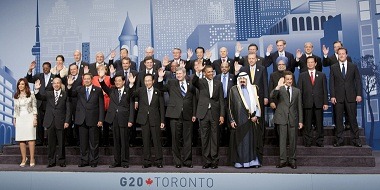

 For centuries, wars have been disrupting the daily lives of innocent civilians. But whileconflicts may have an official ending, the terrors of war often linger long after hostilities end. One of the most frightening remnants of war is the existence of minefields and unexploded ordnance blanketing former battlefields. Mines kill or wound an innocent civilian nearly every 30 minutes, killing or seriously injuring 15,000 to 20,000 people a year.
For centuries, wars have been disrupting the daily lives of innocent civilians. But whileconflicts may have an official ending, the terrors of war often linger long after hostilities end. One of the most frightening remnants of war is the existence of minefields and unexploded ordnance blanketing former battlefields. Mines kill or wound an innocent civilian nearly every 30 minutes, killing or seriously injuring 15,000 to 20,000 people a year. Given that the majority of minefields and unexploded ordnance reside in the developing world, the impacts of explosions are even more pronounced. Local communities do not usually have the resources to treat land mine victims’ physical and psychological injuries. Thus, it is the mission of Clear Path International (CPI) to serve not only the victims of landmine and bomb explosions, but their families and communities as well, to ensure victims are able to reenter their community with renewed confidence.
Given that the majority of minefields and unexploded ordnance reside in the developing world, the impacts of explosions are even more pronounced. Local communities do not usually have the resources to treat land mine victims’ physical and psychological injuries. Thus, it is the mission of Clear Path International (CPI) to serve not only the victims of landmine and bomb explosions, but their families and communities as well, to ensure victims are able to reenter their community with renewed confidence.



